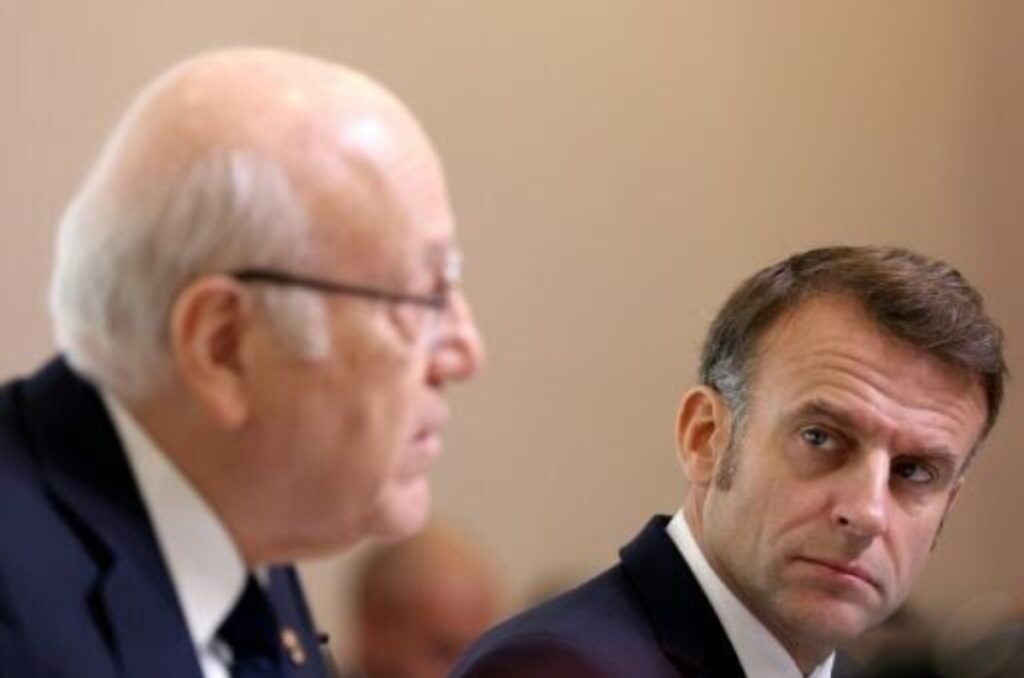AFP

French President Emmanuel Macron said Thursday his country would support Lebanon with 100 million euros, as Paris hosted an aid conference with big financial aims but slim diplomatic prospects.
“The war must end as soon as possible, there must be a ceasefire in Lebanon,” Macron said sitting alongside the country’s Prime Minister Najib Mikati.The Lebanese government chief in turn called on “the international community to hold together and support efforts… to implement an immediate ceasefire”.
France has set a target of raising half a billion euros ($540 million) in aid for Lebanon, 100 million more than an initial UN appeal.
As well as its financial contribution, Macron said Paris would “contribute to equipping the Lebanese army” to re-establish control of the country’s south in line with UN Security Council resolution 1701, which sealed the end of the last Israel-Hezbollah war in 2006.
Paris is also seeking an increase in humanitarian aid for a country to which it has historic ties and which has a large diaspora in France.The latest conflict between Israel and Lebanon’s Hezbollah has so far claimed more than 1,550 lives, according to an AFP tally based on official figures, and displaced 800,000 people according to the UN.
Israel launched a ground offensive against Iran-backed Hezbollah in southern Lebanon in late September, having exchanged fire over the border for a year following Hamas’ October 7, 2023 attack.
Hezbollah must “stop its provocations… and indiscriminate strikes” against Israel, Macron said.
But Israel “knows from experience that its military successes do not necessarily represent victory in Lebanon,” Macron said.
Israel has eliminated Hezbollah leaders over recent weeks.
“I’m not sure that you can defend a civilisation by sowing barbarism yourself,” he added.
Hopes for diplomatic progress in Paris may be stymied by the absence of Iran and Israel, who were not among the 70 countries and 15 international organisations invited, while the US was represented only by a deputy to Secretary of State Antony Blinken.
Macron opened the conference following a one-on-one meeting Wednesday with Lebanon’s Mikati, while Germany and Canada have sent their foreign ministers Annalena Baerbock and Melanie Joly.
Germany said Thursday that it would contribute 96 million euros to the humanitarian aid appeal.
Speaking remotely, United Nations Secretary-General Antonio Guterres called on participants to “strengthen their support to (Lebanon’s) state institutions, including the Lebanese armed forces”.
Host France is pushing for progress on three fronts — diplomacy, humanitarian aid and Lebanon’s domestic politics.
“We’ve put concrete proposals on the table to bring about a ceasefire as quickly as possible,” Foreign Minister Jean-Noel Barrot said in a message posted on X.
France has pushed alongside the United States for a temporary 21-day ceasefire to give space to negotiate a more lasting truce.
Diplomacy offers “the only viable solution for Lebanon as well as for Israel”, where 60,000 people have also fled their homes, Barrot said.
The limited US presence and lack of Israeli or Iranian participation limits prospects for progress.
“Anything that does not bring about an immediate end to the destruction and killing would make this summit a failure,” said Bachir Ayoub, aid group Oxfam’s Lebanon chief.Beyond Macron’s 100-million-euro pledge, France wants to “mobilise humanitarian aid from as many countries as possible”, Barrot said.
Nevertheless, in Lebanon, “the needs are so vast that even if the aid totalled hundreds of millions of dollars, you could cynically see it as a sort of palliative care”, Karim Bitar, an international relations expert at Beirut’s Saint-Joseph University, said ahead of the talks.
The third prong of the effort will be attempts to build up Lebanon’s institutions and especially its armed forces, “to preserve the country’s unity, stability and sovereignty”, Barrot said.
“Resolution 1701… remains the cornerstone of stability and security in southern Lebanon,” Mikati said, echoing France’s view.
As well as stipulating that the only armed forces on Lebanon’s border with Israel should be UN peacekeepers and the Lebanese army, 1701 says no foreign forces should enter Lebanon without the government’s consent.
Conference participants may offer training, equipment and funding for the troops to keep the Lebanese army functioning and allow new recruitment so it is strong enough to do its job.
